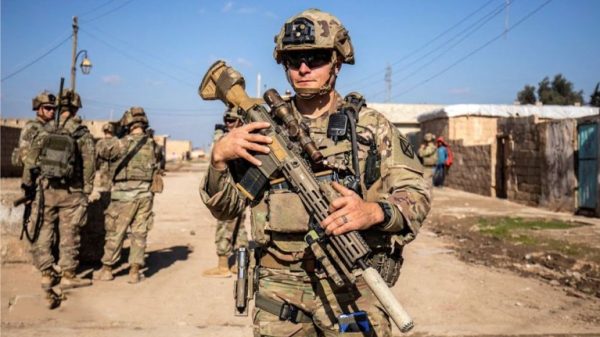US approves plan for strikes on Iran-linked targets in Iraq, Syria: Report

- Update Time : Friday, 2 February, 2024, 06:15 pm
- 85 Time View

Online Desk :
The United States has reportedly approved a plan to attack Iran-linked targets in Iraq and Syria in retaliation for the killing of three soldiers five days ago. US broadcaster CBS News reported on Thursday that the White House has approved the targeting of Iranian personnel and facilities inside the two countries in response to the drone attack on Sunday at the Tower 22 base near the border between Syria and Jordan. It did not provide any further details but said, quoting unnamed US officials, that weather will be a major factor in the timing of the strikes as Washington purportedly wants better visibility to avoid targeting civilians. On Friday, Iran’s President Ebrahim Raisi said his country will “respond strongly” to anyone who bullies it. “We will not start any war but if anyone wants to bully us they will receive a strong response,” Raisi said. “Before, when they [the Americans] wanted to talk to us, they said the military option is ‘on the table’. Now they say they have no intention of a conflict with Iran.”
Tehran’s military power has not and will not pose a threat to any country in the region, the president said in a televised speech, adding that Iran’s strength only creates security for the countries around it. Iran has denied involvement in the drone strike in Jordan. The attack on the US base was claimed by the umbrella group of US and Israel-opposed armed factions called the Islamic Resistance in Iraq. It marked the first time an American soldier was killed since the start of Israel’s war on Gaza. Iran-aligned groups have launched hundreds of attacks on US bases in Iraq and Syria in recent years, but their attacks have only intensified since the start of the war on Gaza and the unwavering US support for it despite international calls for a ceasefire. The Iraqi group is a member of the “axis of resistance” that is backed by Tehran across the region, but Iran maintains that members of the axis decide and act independently and do not take orders from it.
US President Joe Biden has promised a response, which has yet to come five days after the attack. US officials have said their strikes could take place over several days, have multiple targets, and be “sustained over time”. Both Iran and the US have said they wish to avoid escalating the military fallout of Israel’s war, which has spread to include Israel’s border fighting with Lebanon’s Hezbollah and Yemen’s Houthi attacks on Red Sea shipping and US and United Kingdom vessels. But Hossein Salami, the commander-in-chief of Iran’s Islamic Revolutionary Guard Corps (IRGC), has warned that Tehran would respond to any US strikes. Reports have also suggested that Tehran and Washington have exchanged messages since the Syria-Jordan border strike, with Iran seriously warning against any attacks on its soil.
Hawkish Republican officials in the US have called for direct strikes on Iran, something that is likely to spread the scope of the war. In January 2020, after the US assassinated Iran’s top general Qassem Soleimani in Iraq, Iran launched missiles at a US base in Iraq which injured dozens of soldiers but did not kill anyone. The Islamic Resistance in Iraq said Wednesday it would “suspend” military operations against US forces to prevent further embarrassment for the Iraqi government. US Defense Secretary Lloyd Austin said Washington would watch for actions rather than words. The pro-Iran al-Nujaba movement said on Friday it would press on with attacks on US forces in the Middle East until its demands are met for US troops to leave Iraq and for an end to Israel’s war on Gaza. A US air strike in early January had killed a senior commander of al-Nujaba. Biden is expected at the Dover Air Force Base in Delaware on Friday to oversee the transfer of the remains of the three soldiers.










